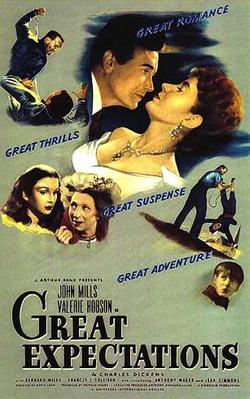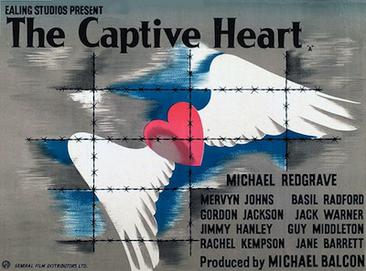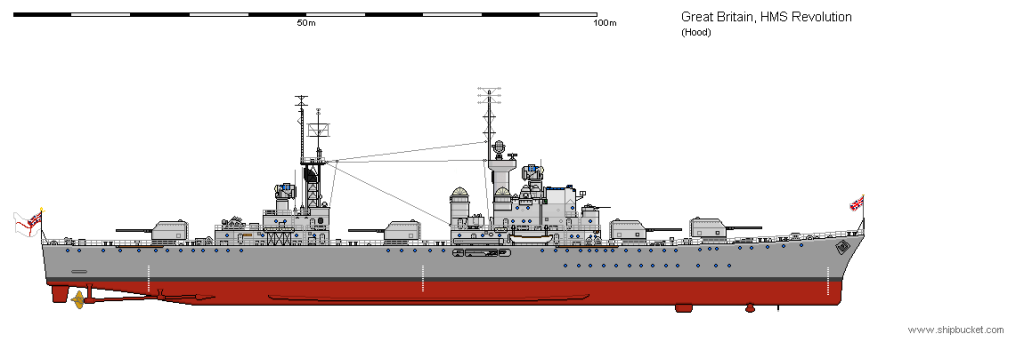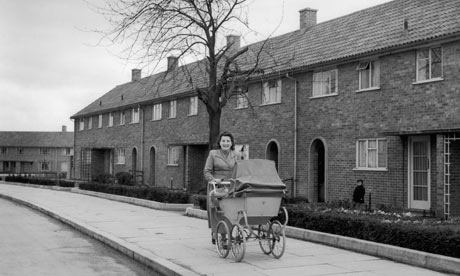Cinemagoing reaches an all-time peak, with 1,635 million admissions during the year.

Great Expectations was one of the box-office hits of the year. Based on the novel by Charles Dickens, the film was directed by David Lean and stars John Mills, Bernard Miles, Finlay Currie, Jean Simmons, Martita Hunt, Alec Guinness and Valerie Hobson. The script is a slimmed-down version of Dickens' novel inspired by an abridged stage version of the novel, in which Guinness (responsible for the adaptation) played, which was written by David Lean, Anthony Havelock-Allan, Cecil McGivern, Ronald Neame and Kay Walsh. Guinness and Hunt reprised their roles in the film, but the film was not a strict adaptation of the stage version. The film was produced by Ronald Neame and photographed by Guy Green. The film won critical praise upon release, with many commentators hailing it as the finest film yet made from a Dickens novel. It was also the third most popular film at the British box office in 1947 and most popular movie at the Canadian box office in 1948. Great Expectations won Academy Awards for Best Art Direction-Set Decoration, Black-and-White (John Bryan, Wilfred Shingleton) and Best Cinematography, Black-and-White, and was nominated for Best Director, Best Picture and Best Writing, Screenplay.
Appointment is a crime thriller directed by John Harlow and starring William Hartnell, Raymond Lovell, Robert Beatty, Joyce Howard and Herbert Lom.
In the film, Leo Martin (Hartnell) works for a criminal gang run by Gus Loman (Lovell) that primarily uses a smash and grab tactic. During one particular risky robbery, Leo has his wrists broken and is soon caught and sentenced to prison. Throughout his stay, Leo does not reveal who he is working for but serves his time angered by Gus for running out on him during the robbery. When Leo is released he returns to Gus to obtain a job but is rebuffed, Gus points out how Leo’s injured wrists would prevent him from working as a thief. This leads to Leo to seek complete vengeance against Gus. He decides to frame Gus for murder by stealing his gun and murdering a taxi driver. He manages to provide himself with an alibi to avoid any prosecution. During this scheme he meets Carol Dane (Howard) who is unaware of his true nature and they begin a romance. Later, Leo blackmails Gus with the gun. After Gus pays Leo he contacts Gregory Lang (Lom) who he is actually working for. Meanwhile, Leo learns that Detective Inspector Rogers is investigating the murder case. He attempts to assure Rogers that he is attempting to live a life away from crime but Rogers continues to question Leo’s character and whereabouts during the night of the murder. Then Leo and Gregory learn that it was actually Gregory’s gun that was used for the murder and Gregory becomes upset plans to murder Gus. Leo’s wrists are crushed again but he and Gus reach a deal for Leo to bring back the gun and steal a jewel. All the while, Rogers uncovers more and more clues. When Leo steals the jewel and brings back the gun to Gregory, a gunfight ensues leaving Gregory dead. As Leo jumps on the train to run away with Carol, she confronts him about his lies. Soon after, Rogers arrives after finally learning that Leo murdered the taxi driver. He prepares to apprehend Leo but Leo tries to jump out of the train window only to have the window slam shut on his wrists.
Bad Company is a drama directed by Paul Barrelet and written by R. Wakeley. It stars Mabel Constanduros and Diana Dawson. Its plot involves a dancer whose career was ruined in an accident, but has her mobility restored by a surgeon. Things are complicated when her boyfriend gives her a stolen diamond.
Bedelia is an adaptation of the novel Bedelia by Vera Caspary directed by Lance Comfort and starring Margaret Lockwood, Ian Hunter and Barry K. Barnes. It moves the events of the book from the United States to England and Monaco.
Beware of Pity is a romantic drama film directed by Maurice Elvey and starring Lilli Palmer, Albert Lieven and Cedric Hardwicke. It is based on the novel of the same name by Stefan Zweig. A paraplegic young baroness mistakes compassion for love. The film's costumes were designed by Cecil Beaton. It was made by Two Cities Films at Islington Studios.

The Captive Heart is a drama directed by Basil Dearden. The film was entered into the 1946 Cannes Film Festival. The plot concerns a Czech nationalist fugitive Karel Hasek (Michael Redgrave) who assumes the identity of a dead British officer, Captain Geoffrey Mitchell during 1916 after escaping from a German prison. When he is caught, becomes a British prisoner of war. He is suspected of being a spy by his fellow soldiers because of a few small errors and his fluency in the German language. Captain Grayson (Guy Middleton) wants to lynch him forthwith, but Major Dalrymple (Basil Radford), the senior British officer, believes Hasek’s story when he is questioned. To avoid suspicion, he has to maintain the fiction that Mitchell is still alive by corresponding with Mitchell's widow Celia (Rachel Kempson). Prior to the war, Mitchell had abandoned his wife and their two children, but the letters rekindle Celia's love. After their escape tunnel is discovered, the prisoners resign themselves to a long stay. When Herr Forster (Karel Stepanek), who in reality is member of German military intelligence who knows Hasek, visits the camp, Hasek fears he may be unmasked. The official seems to recognise him, but cannot quite place him. Hasek is sure time is running out; it is announced that some prisoners are to be repatriated, but when he goes for his medical examination he is turned away. A plan is devised to save him (without his knowledge). Private Mathews (Jimmy Hanley), a burglar in civilian life, breaks into the Kommandant's office late at night with two other men. They find the list of those to be repatriated and replace Mathews' own name with Mitchell's. On the way back to the barracks, Mathews is attacked by a guard dog and rescued by Hasek. The plan works, and Hasek is "returned" to England. He goes to see Celia. He breaks the news of her husband's death and that he has grown to love her. She is devastated, and Hasek leaves. After she recovers, she begins rereading his letters and realises that she has come to love the writer. When Hasek calls her on the telephone on 11 November 1917, Armistice Day, she is eager to speak with him.
Caravan is a drama film directed by Arthur Crabtree. It is another of the Gainsborough melodrama series and is based on the novel Caravan by Eleanor Smith. It stars Stewart Granger and Jean Kent. In the film, late 19th century writer Richard Darrell (Stewart Granger), saves Don Carlos (Gerard Heinz) from two robbers. Don Carlos gives Richard the task of taking a valuable necklace to Iberia. Bidding farewell to his fiancée Oriana (Anne Crawford), Richard sets out. On the way he meets Wycroft (Robert Helpmann), who assaults, robs and nearly kills Richard on behalf of his dastardly master Sir Francis Castteldow (Dennis Price), an aristocrat who plans to steal Oriana from Richard. Oriana thinks Richard is dead and marries Francis, whilst Richard loses his memory as a result of the assault and marries a gypsy girl, Rosal (Jean Kent). However, everyone will meet again...
Men of Two Worlds is a Technicolor drama directed by Thorold Dickinson and starring Robert Adams, Eric Portman and Phyllis Calvert. The film sees an African music student return home to battle a witch doctor for control over his tribe.
Piccadilly Incident is drama directed by Herbert Wilcox and starring Anna Neagle, Michael Wilding, Coral Browne, Edward Rigby and Leslie Dwyer. In the film, a married woman is believed dead in a shipwreck, but returns home to find her husband remarried.
They Knew Mr. Knight is a drama directed by Norman Walker and made by Norman Walker's G.H.W. Productions, funded by the Rank Organisation, at Denham Studios. The film stars Mervyn Johns, Nora Swinburne and Joyce Howard. It is based on a 1934 novel of the same title by Dorothy Whipple. The plot sees a man is sentenced to twelve months in Lincoln jail following his involvement in a share scam, plunging himself and his family into despair. However, by the time of his release he is able to face his uncertain future with fortitude.
Woman to Woman is a drama directed by Maclean Rogers and starring Douglass Montgomery, Joyce Howard and Adele Dixon. It is based on the play of the same title by Michael Morton. The plot sees a British gentleman and a French dancer engage in a doomed romance.
The Years Between is an adaptation of the novel of the same name by Daphne du Maurier. It was directed by Compton Bennett and stars Michael Redgrave, Valerie Hobson and Flora Robson. The film charts the homecoming of a British intelligence officer, who had been working in Germany during the Great War and was presumed dead. His wife is about to marry again, and to become an MP, and all must now readjust to the new situation.
The Curse of the Wraydons is a thriller directed by Victor M. Gover and starring Tod Slaughter, Bruce Seton and Henry Caine. It is based on the play Spring-Heeled Jack by Maurice Sandoz and was made at Bushey Studios. The film is set during the Napoleonic Wars and revolves around an English exile who agrees to become a spy for France.

Green for Danger is thriller film, based on the popular 1944 detective novel of the same name by Christianna Brand. The film was directed by Sidney Gilliat and stars Alastair Sim, Trevor Howard, Sally Gray and Rosamund John. The film was made at Pinewood Studios in England. The title is a reference to the colour-coding used on anaesthetists' gas bottles. It is set in a fictional rural British hospital somewhere in the Southeast of England. A patient dies on the operating table. The anaesthetist, Barney Barnes (Howard), has had a patient die in similar circumstances previously. Inspector Cockrill (Sim) is asked to investigate when Sister Bates (Campbell) is killed after revealing that the death of Higgins was not an accident. Cockrill's investigation is hampered by the conflict between Barnes and Eden because of their competition over the affections of nurse Freddi (Gray). After another murder attempt is directed at Freddi, the inspector restages the operation in order to unmask the murderer.

Night Boat to Dublin is a thriller directed by Lawrence Huntington and starring Robert Newton, Raymond Lovell, Guy Middleton, Muriel Pavlow and Herbert Lom. The film’s plot concerns an immigrant scientist passing information to a European power through the Republic of Ireland. British intelligence attempts to break this link.
School for Secrets is a humours thriller written and directed by Peter Ustinov and starring David Tomlinson, Ralph Richardson, Raymond Huntley, Richard Attenborough, John Laurie and Michael Hordern. The films tells the story of a group of five different 'Boffins', research scientists, who discover and develop radio location, being brought together to work in secrecy and under pressure. Their dedication disrupts their family lives as they are forced to sacrifice everything to make a breakthrough. The film was made in co-operation with the Air Ministry.
Send for Paul Temple is a crime thriller directed by John Argyle and starring Anthony Hulme, Joy Shelton and Tamara Desni. This is the first of four film planned adaptations of the Paul Temple stories. In the film, Paul Temple is called in after a major diamond theft.
Tehran is a joint British-Italian thriller co-directed by Giacomo Gentilomo and William Freshman. It was also released under the alternative titles Appointment in Persia and The Plot to Kill Roosevelt. It stars Derek Farr as Pemberton Grant, a British intelligence officer who discovers a plot to assassinate the Prime Minister during a state visit to Tehran. It also stars Marta Labarr, Manning Whiley and Pamela Stirling.
Wanted for Murder is a crime thriller directed by Lawrence Huntington and starring Eric Portman and Dulcie Gray. In the film, Anne Fielding is delayed on the London Underground making her late for a meeting with her friend, Victor James Colebrooke. There, she meets Jack Williams who is also delayed. The two take an immediate liking to each other. Victor is the grandson of a notorious hangman and is gradually becoming insane, he finds himself unable to resist the urge to strangle women to death. Although he is in love with Anne, he does not know how much longer he can prevent himself from killing her. Inspector Conway investigates Victor's murders and pieces together all of the evidence he finds that Victor appears to be purposely leaving behind.
The Grand Escapade is an adventure film directed by John Baxter and starring James Harcourt, Patric Curwen and Peter Bull. The plot sees three boys join an old traveller on his journey through Southern England, eventually helping to expose and capture some smugglers.
A Girl in a Million is a comedy directed by Francis Searle and starring Hugh Williams and Joan Greenwood.
Here Comes the Sun is a comedy directed by John Baxter and starring Bud Flanagan, Chesney Allen and Elsa Tee. The film follows a sports reporter, on the run from the police, as he tries to clear his name.
Quiet Weekend is a comedy directed by Harold French and starring Derek Farr, Frank Cellier and Marjorie Fielding. It is a sequel to the 1941 film Quiet Wedding with several of the actors reprising their roles and is based on the 1941 play Quiet Weekend. A family try to relax during a weekend holiday in the country but are constantly irritated by the unpleasant friend of their eldest son.
Under New Management is a comedy directed by John E. Blakeley and starring Nat Jackley, Norman Evans and Dan Young. A chimney sweep inherits a hotel and calls on a number of friends to staff it with mixed results!
I'll Turn to You is a musical directed by Geoffrey Faithfull and starring Terry Randall and Don Stannard.
The Laughing Lady is a musical drama directed by Paul L. Stein based on a play by Ingram D'Abbes. It stars Anne Ziegler, Webster Booth and Francis L. Sullivan. During the French Revolution, a young aristocrat makes a deal with Robespierre that he will locate and steal some diamonds from Britain in order to save his mother from the guillotine.
Lisbon Story is another musical thriller directed by Paul L. Stein and starring Patricia Burke, David Farrar, Walter Rilla and Austin Trevor. The plot sees a cabaret singer and a British intelligence officer travel to a European capital to rescue a scientist being held there.
London Town is the biggest musical production of 1946 being a Technicolor film produced by the Rank Organisation. Rank recruited American songwriters Jimmy Van Heusen and Johnny Burke, Ted Heath and his orchestra and the costumes were designed by the legendary designer Orry-Kelly, The screenplay by Sig Herzig, Val Guest, and Elliot Paul, is based on a story by director Wesley Ruggles, revolving around comedian Jerry Sanford (Sid Field), who arrives in London believing he has been hired as the star of a major stage production, when in fact he's merely an understudy. Thanks to his daughter Peggy (Petula Clark), who sabotages the revue's star Charlie de Haven (Sonnie Hale), he finally gets his big break. The premise allows for a variety of musical numbers and comedy sketches performed by, among others, Kay Kendall and Tessie O'Shea.
The Magic Bow is a musical based on the life of the Italian violinist and composer Niccolò Paganini. It was directed by Bernard Knowles and starring Stewart Granger, Phyllis Calvert, Jean Kent, Dennis Price and Cecil Parker. It was entered into the 1946 Cannes Film Festival.

A Matter of Life and Death is a romantic fantasy film created by the writing-directing-producing team of Michael Powell and Emeric Pressburger. It stars David Niven, Roger Livesey, Raymond Massey, Kim Hunter and Marius Goring. The film was produced by D&P Studios and Denham Studios in Denham, Buckinghamshire and was shot in Three-Strip Technicolor and black and white for the heaven scenes. For these the colour was not fully developed, giving a pearly hue to the black and white shots, a process called Colour and Dye-Monochrome Processed in Technicolor. Production took place from 2 September to 2 December 1945, used twenty-nine sets, and cost an estimated £320,000.
The film was chosen for the first ever Royal Film Performance on 1 November 1946 at the Empire Theatre, London. It then went into general release on 15 December 1946. The film subsequently had its US release in New York on 25 December 1946 under the name Stairway to Heaven.
The plot sees a British Royal Air Force pilot Squadron Leader Peter Carter (David Niven) trying to fly a badly damaged aircraft home. He manages to contact June (Kim Hunter), a radio operator and talks with her for a few minutes before jumping without a parachute. Peter should have died at that point, but Conductor 71 (Marius Goring), the guide sent to escort him to the "Other World", misses him in the thick fog over the English Channel. The airman wakes up the next day on a beach near June's base. At first, he assumes he is in the afterlife, but then, after a de Havilland Mosquito flies low overhead, discovers to his bewilderment that he is still alive. Peter meets June and they fall in love. Conductor 71 (an aristocrat executed in the French Revolution) stops time to explain the situation to Peter and urge him to accept his death and accompany him to the Other World, but Peter demands that the matter be appealed. Conductor 71 informs him he can appeal and has three days to prepare his case. He may choose a defending counsel from among all the people who have died, but has great difficulty picking one. Peter's visions are diagnosed by June's fascinated friend Doctor Reeves (Roger Livesey) as a symptom of a brain injury and he is scheduled for surgery. Reeves is killed in a motorcycle accident while trying to find the ambulance that is to take Peter to the hospital, which allows him to act as Peter's counsel. Reeves argues Peter’s case and that his new earthly commitment should take precedence over the afterlife's claim on him. The matter comes to a head, in parallel with Peter's brain surgery, before a celestial court. In the end, Reeves has June take the stand (she is made to fall asleep in the "real" world by Conductor 71 so she can testify) and proves that she genuinely loves Peter by telling her that the only way to save his life is to take his place. She steps onto the stairway to the Other World without hesitation and is carried away, leaving Peter behind. Then the stairway comes to an abrupt halt and June rushes back to Peter's open arms. The jury rules in Peter's favour. The scene then shifts to the operating room, where the surgery is declared a success by the surgeon.

Quoted





